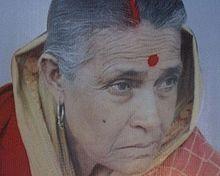|
Her songs, popularly called the Goalparia Loka geets, are a part of a cultural community, largely the Rajbanshis, who have been historically dispersed around a vast territory including Assam, Bengal, Bihar, Southern Nepal and even Bangladesh. When Pratima Barua picked up the songs, they were seemingly in their last phase of life in public memory, for the history of the land took a sharp turn forcing the communities living in the periphery to abandon their cultural moorings and acquire new identities to conform to the altered geo-political legacy of the colonial times.
Barua Pandey was born on October 3, 1935, in Kolkata. She pursued her early education in the city's Gokhale Memorial School, after which she came to Assam to study at the Girls' High School, Gauripur, home of the royal family. She mostly spent her early years in between the din of Kolkata and the soothing environments of riverside "Gadadhar" at Gauripur.
Although she learned Rabindrasangeet at school, but she never took any formal training or teaching in music except the encouraging words from her father Prakitesh Chandra Barua (Lalji). Dr. Bhupen Hazarika made the most significant contribution in bringing Pratima Barua to the fore as an artist of repute in Assam. The most crucial point in her life came when Dr. Bhupen Hazarika visited Gauripur in 1955 and attended a jalsa organised on a social occasion, the shy young Pratima, though tongue-tied with fear, let her voice and the lyrics of the lokageet in Goalpariya dialect flow in tune with the strings and rhythms of the dhol, junuka, dotora, darinda, dhuluki and Bashi which are musical instruments in Goalpariya culture. Dr. Hazarika was highly impressed and predicted that this voice would definitely take Goalpariya lokageet to great heights. Later he continued his tireless moral and material support to establish that Goalpariya lokageet was a part of greater Assamese geet.
It was also the time when the speakers of Rajbanshis, the major language group speaking the language of these songs, had taken the political strategy of accepting mainstream Assamese language as their mother tongue in Assam. Similarly the Rajbanshis of Coochbehar in West Bengal acquired the dominant Bengali identity thereby relegating their own language to a sub-dialect. As a result, their traditional folk songs also receded from the public sphere into little- known private domains.
Pratima Barua's rendition of folk songs not only revived a folk form but also the language of the erstwhile Goalpara district of Assam, presently comprising the four districts of west Assam, namely Goalpara, Bongaigaon, Kokrajhar and Dhubri.
Indeed, he first presented Goalpariya folk song in his film Era Bator Sur. Besides the mahout songs, Barua Pandey used to sing Paul Robeson's evergreen hit We are in the same boat brother in stage shows. She married to Gauri Shankar Pandey, a retired principal of the Gauripur P. B. College.
The next big thing to happen was the radio broadcast of Pratima Barua's folksongs. Dr. Bhupen Hazarika took the initiative to broadcast the songs of Pratima Barua in 1961 when they were members in the Programme Advisory Committee of All India Radio, Guwahati. Purushottam Das, who later became an eminent cultural figure of Assam, decided to record her songs in the studios of All India Radio, Guwahati. For the people of Goalpara, it was strange to hear the voice of Pratima Barua on air singing the songs traditionally sung by ordinary farmers, maishals and mahouts. The songs were not received easily by sections of Assamese people that had nurtured frenetic Assamese nationalism. They raised strong objections against the broadcasting of Pratima Barua's songs, which they alleged were 'non Assamese' and 'Bengali'. In 1958, she made her debut on the dais of Gana Mancha, the left-leaning cultural wing, in Shillong upon the initiative of her father and Bhuban Chandra Prodhani of Golakganj who were the members of the Assam state assembly in Shillong at the time. Later, she was closely associated with the IPTA. She became almost a regular feature at the annual conventions of Assam Sahitya Sabha and the All Assam Students' Union who honoured her with the highest public respect of the organization by declaring her a legendary folk singer.
She was died in 27 December 2002 in GNRC hospital at Guwahati. When she was removed from the life support system the whole of Assam deeply felt the void she'd left behind. Normally it takes about five hours by road from Guwahati to Gauripur; that day it took more than twenty hours because all along the road, throughout the night, people were waiting, braving the incessant drizzle, to have one last glimpse of their favourite princess. At Gauripur, a sea of people accompanied her hearse to the cremation ground. Apart from the members of the cultural and cinema
Pratima Barua Pandey was awarded the Padmashree and Sangeet Natak Akademi for her pioneering efforts in popularising Goalpariya lokageet. A documentary flim made on her life and works by noted filmmaker Prabin Hazarika, Hastir Kanya, won national award for best biographical film in 1997, earned great appreciation and created waves at the South Asia film festival in 1998. |



